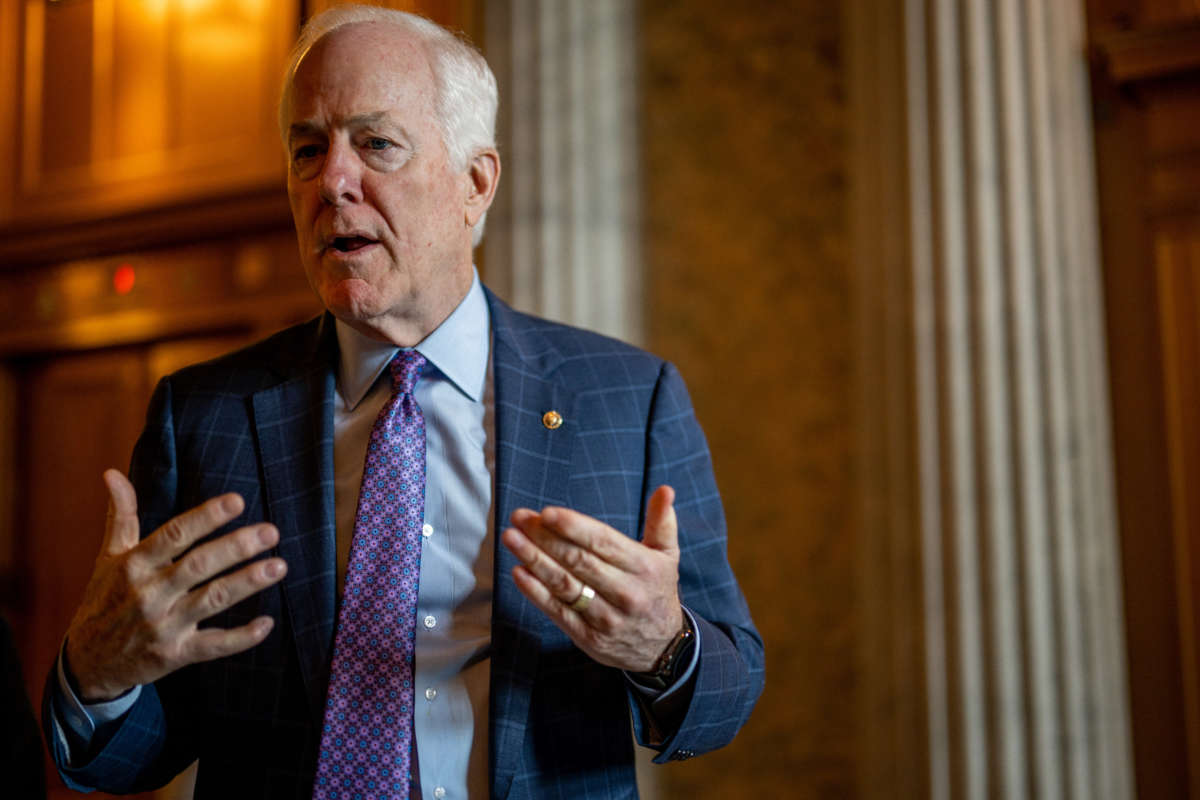Support justice-driven, accurate and transparent news — make a quick donation to Truthout today!
Republican Sen. John Cornyn (Texas) recently wrote a tweet in support of the Supreme Court’s anti-abortion decision in which he appeared to advocate for far right justices to reexamine cases on racial segregation as well.
Cornyn was responding to a tweet from former President Barack Obama, who chastised the court for its reversal of “nearly 50 years of precedent” recognizing abortion protections throughout the country.
The court’s ruling to undo its previous findings in the landmark 1973 decision, Roe v. Wade, “relegated the most intensely personal decision someone can make to the whims of politicians and ideologues — attacking the essential freedoms of millions of Americans,” Obama said.
Cornyn directly quoted Obama’s tweet in his post celebrating the reversal of Roe.
“Now do Plessy vs Ferguson/Brown vs Board of Education,” Cornyn wrote, referring to two Supreme Court rulings on racial segregation.
Now do Plessy vs Ferguson/Brown vs Board of Education. https://t.co/hrUYCcIq8Y
— Senator John Cornyn (@JohnCornyn) June 25, 2022
Many social media users pointed out that it appeared that Cornyn was calling for the Supreme Court to reexamine rulings regarding racist laws that had allowed states to impose segregation in schools and other public institutions.
In Plessy, the court alleged in 1896 that local and state governments had the right to segregate public facilities, and that the Constitution afforded no guarantees of equal treatment under the law. The ruling established the precedent of “separate but equal” — a notion that the Court ultimately rejected in its 1954 ruling in Brown, wherein it recognized that segregation was inherently inequitable, especially in public schools.
Hours later, after facing widespread backlash, Cornyn issued another tweet. “Thank goodness some SCOTUS precedents are overruled,” he wrote, suggesting that he had meant to highlight the idea that the Court should be able to change its mind on errant rulings made in the past, using the Plessy and Brown cases as examples.
However, that explanation is still “puzzling,” according to BET news writer Paul Meara, “considering Roe, similar to Brown, established rights for people, while its reversal removed them.”
Social media users echoed this sentiment, writing that Cornyn’s tweet was offensive regardless of his explanation.
“Brown granted more rights to existing precedence [sic],” wrote one user. “What SCOTUS did [last week] was remove rights. This is a bad faith argument and simply serves to deflect and distract.”
“Brown v The Board of Education increased freedoms; whereas [last week’s Supreme Court ruling] restricted healthcare freedom for millions,” said another Twitter user.
Trump is silencing political dissent. We appeal for your support.
Progressive nonprofits are the latest target caught in Trump’s crosshairs. With the aim of eliminating political opposition, Trump and his sycophants are working to curb government funding, constrain private foundations, and even cut tax-exempt status from organizations he dislikes.
We’re concerned, because Truthout is not immune to such bad-faith attacks.
We can only resist Trump’s attacks by cultivating a strong base of support. The right-wing mediasphere is funded comfortably by billionaire owners and venture capitalist philanthropists. At Truthout, we have you.
Truthout has launched a fundraiser, and we have only 24 hours left to raise $15,000. Please take a meaningful action in the fight against authoritarianism: make a one-time or monthly donation to Truthout. If you have the means, please dig deep.
